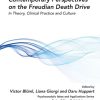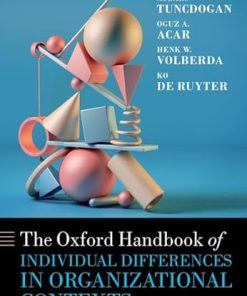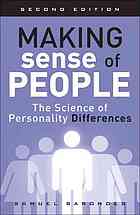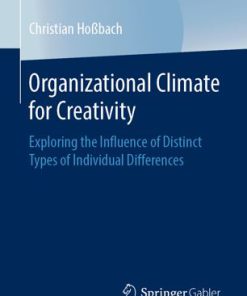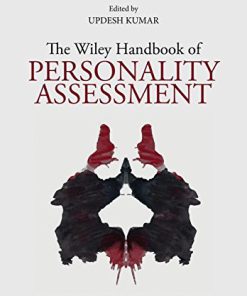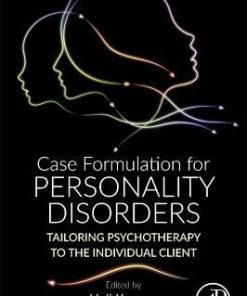The Wiley Encyclopedia of Personality & Individual Differences (4 Volumes) 1st Edition Bernardo 1119793912 9781119793915
$50.00 Original price was: $50.00.$25.00Current price is: $25.00.
This completed downloadable of The Wiley Encyclopedia of Personality & Individual Differences (4 Volumes) 1st Edition Bernardo J. Carducci
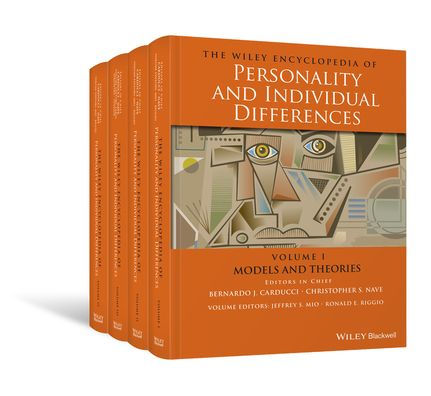
Instant downloaded The Wiley Encyclopedia of Personality & Individual Differences (4 Volumes) 1st Edition Bernardo J. Carducci pdf docx epub after payment.
Product details:
- ISBN-10 : 1119793912
- ISBN-13 : 9781119793915
- Author: Bernardo J. Carducci
Volume 1, Models and Theories of The Wiley Encyclopedia of Personality and Individual Differences The Encyclopedia of Personality and Individual Differences (EPID) is organized into four volumes that look at the many likenesses and differences between individuals. Each of these four volumes focuses on a major content area in the study of personality psychology and individuals’ differences. The first volume, Models and Theories, surveys the significant classic and contemporary viewpoints, perspectives, models, and theoretical approaches to the study of personality and individuals’ differences (PID). The second volume on Measurement and Assessment examines key classic and modern methods and techniques of assessment in the study of PID. Volume III, titled Personality Processes and Individuals Differences, covers the important traditional and current dimensions, constructs, and traits in the study of PID. The final volume discusses three major categories: clinical contributions, applied research, and cross-cultural considerations, and touches on topics such as culture and identity, multicultural identities, cross-cultural examinations of trait structures and personality processes, and more. Each volume contains approximately 100 entries on personality and individual differences written by a diverse international panel of leading psychologists Covers significant classic and contemporary personality psychology models and theories, measurement and assessment techniques, personality processes and individuals differences, and research Provides a comprehensive and in-depth overview of the field of personality psychology The Encyclopedia of Personality and Individual Differences is an important resource for all psychology students and professionals engaging in the study and research of personality.
Table of contents:
Contributor Biographies
Gordon Allport
See Also
References
Further Reading
Roy F. Baumeister
Research
See Also
References
Further Reading
Jack Block
Background
Major Contribution: The Block and Block Longitudinal Study
Other Notable Works: The Q‐Sort Method in Personality Assessment
Acknowledgments and Awards
Conclusion: Personality and Individual Differences
See Also
References
Further Reading
David M. Buss
Background
Major Research
Authored Books and Popular Press
Acknowledgments and Awards
See Also
References
Further Reading
Paul T. Costa Jr.
Background
Acknowledgments and Awards
Conclusion: Personality and Individual Differences
See Also
References
Further Reading
Robert McCrae
Background
Acknowledgments and Awards
Conclusion: Personality and Individual Differences
See Also
References
Further Reading
Ed Diener
Personal Life
Early Research Career: Deindividuation
Subjective Well‐Being
Awards and Service
Mentorship and Philanthropy
See Also
References
Further Reading
Erik H. Erikson
The Nature and Expression of Personality Development
The Eight Stages of Psychosocial Development
See Also
References
Further Reading
Hans J. Eysenck
See Also
References
Further Reading
David Funder
See Also
References
Further Reading
Lewis R. Goldberg
See Also
References
Further Reading
Karen Horney
See Also
References
Further Reading
Carl Jung
Structure of the Mind
The Dynamics of Personality
Personality Assessment
See Also
References
Abraham H. Maslow
The Motivational Nature of Personality
Hierarchy of Needs
See Also
References
Further Reading
Dan McAdams
See Also
References
Further Reading
Walter Mischel
Background
The Marshmallow Test, Hot‐vs‐cool Systems, and Current Relevance of this Research
The Person‐Situation Debate and the Cognitive‐Affective Personality System (CAPS)
Acknowledgments and Awards
Conclusion
See Also
References
Further Reading
Carl Rogers
Rogerian Therapy
Career Accomplishments
Early Life
Career
The Gloria Films
Learner‐centered Teaching
See Also
References
George Kelly
See Also
References
Further Reading
Agreeableness
Measuring Agreeableness
Agreeableness Research and Theory
Future Directions in Research, Theory, and Methodology
See Also
References
Further Reading
Individual Psychology of Alfred Adler
Tenets of Individual Psychology
Therapeutic Applications of Individual Psychology
See Also
References
Further Reading
Animal Personalities
Introduction
Quantifying Animal Personalities
Genetic Mechanisms
Neuroendocrine and Physiological Mechanisms
Effects of Early Experience on Personality
Cognition and Learning
Social Behavioral Ecology and Personality
Ecological Implications
See Also
References
Further Reading
Conscientiousness
Introduction
History and Assessment
Structure
Benefits of Conscientiousness
Pathways
The Dynamic Nature of Personality
Conclusion
See Also
References
Further Reading
Cognitive‐Affective Processing System (CAPS)
Core Ideas and Theoretical Importance
Central Premises
Key Variables
Applying CAPS to Important Psychological Phenomena
See Also
References
Further Reading
Cattell Trait Theory Lexical Analysis
History of the Lexical Approach to Personality
Cattell’s Factor Analysis
Cross‐Cultural Validation
Development of Personality Assessment Using the Lexical Approach
Critiques of Cattel’s Lexical Model
See Also
References
Further Reading
Interpersonal Circumplex
Conceptualization and Structure
History and Assessment
Additional Applications of the Interpersonal Circumplex
See Also
References
Further Reading
Psychodynamic Perspective of Defense Mechanisms
Measures
Personality
Psychopathology
Sex Differences
See Also
References
Delay of Gratification
What Is It? Conceptualization
How Is It Studied? The Paradigm, Developments, and Major Findings
How Is It Explained? Theoretical Background
What Is the Biological Mechanism? Neurocognitive Perspective
How It Can be Developed? Future Directions
See Also
References
Further Reading
Extraversion – Introversion
The Extraversion‐Introversion Dimension: Overview
Development of the Extraversion‐Introversion Dimensions
Biological Correlates
Personality Correlates
See Also
References
Further Reading
Ego Control/Ego Resiliency Theory (ARCH)
Ego Control and Ego Resiliency Development
Personality Types
Continuing Research on Ego Control, Ego Resiliency, and ARCH Typology
See Also
References
Emotional Intelligence
Emotional Intelligence
Relationship between Emotional Intelligence and Positive Outcomes
Can Emotional Intelligence be Increased through Training?
Future Directions
See Also
References
Erikson’s Stages of Psychosocial Development
Background
Lifespan Development
Erikson’s Stages of Psychosocial Development
Autonomy vs. Shame and Doubt
Erikson’s Stages Today
See Also
References
Further Reading
Evolutionary Theory of Personality
Emergence of Specific Traits
Success of the Individual
Mate Choice
Variation in Personality
See Also
References
Further Reading
Psychoticism
See Also
References
Further Reading
Five Factor Model, Facets of
Overview
Five Factors
Facets
Efforts toward a Taxonomy of Facets
Facet‐Level Differences in Heritability, Development, and Prediction
Measuring Facets
Future Research
See Also
References
Further Reading
Gender Differences in Personality, Evolutionary Perspective on
Human Mating Behaviors
Human Sexual Behavior
Mate Retention Strategies
Jealousy
Evaluation of Evolutionary Perspective of Personality
Limitations
Conclusion
See Also
References
Contemporary Theories of Gender Identity
See Also
References
Further Reading
Gene‐environment Interaction
References
Further Reading
Goldberg vs Costa/McCrae Five Factors
See Also
References
Further Reading
Grit
Definition of Grit
The Grit Scale
Grit and Aging
Paragons of Grit
Etiology of Grit
See also
References
Further Reading
Hedonic Adaptation
See Also
References
Heritability
See Also
References
Further Reading
HEXACO Model of Personality
Origins
Assessment
Comparisons with Five‐Factor Model
Theoretical Basis
The HEXACO Model in Research
See Also
References
Further Reading
Independent/Interdependent Self
Measurement and Conceptualization
Culture
Cognition
Emotion
Future Directions
See Also
References
Further Reading
Personal Construct Theory of George A. Kelly
Personal Construct Theory (PCT)
Nature of Personality Adjustment
Personality Assessments Based on PCT
Psychotherapy Based on PCT
Evaluation of Kelly’s PCT
Conclusion
See Also
References
Further Reading
Maslow’s Hierarchy of Needs
The Motivational Nature of Personality
The Hierarchy of Needs
Some Points of Clarification on the Hierarchy of Needs
Evaluation of the Hierarchy of Needs
See Also
References
Further Reading
Meaning in Life
Humanistic‐Existential Perspectives on Meaning
Meaning Maintenance
Meaning and Well‐Being
Is Meaning Just a Feeling?
Conclusion
See Also
References
Neuroticism
Hallmarks of Neuroticism
Theories of Neuroticism
Measures of Neuroticism
Life Span Development and Sex Differences
Psychopathology and Life Outcomes
Biological Influences
See Also
References
Further Reading
Narrative Approach
Introduction
History and Origins of Narrative in Psychology
Narrative Theories of Personality
Narrative Therapy
Criticism
Conclusion
See Also
References
Further Reading
Openness
Definitions of Openness
Theoretical Background of Openness
Measurement of Openness
Stability vs. Change of Openness
Gender and Cultural Differences in Openness
Micro‐social Influences of Openness: Mental Health, Well‐Being, and Interpersonal Relationships
Macro‐social Influences of Openness: Social Attitudes, Political Ideology, and Values
See Also
References
Further Reading
Optimism/Pessimism Carver and Scheier Theory
Conceptualized
Life Orientation Test (LOT and LOT‐R)
Predictive Qualities
Current Status
See Also
References
Further Reading
Personal Projects
Origin and Definition
Project Appraisal
New Directions in Theory, Methodology and Application
See Also
References
Personality and Language
Characterized and Conceptualized
Language Analysis Methods and Techniques
Manual‐Based Language Coding
Automated Text Analysis
Dimensions of Language in Personality and Personality Processes
See Also
Further Reading
Personality Stability and Change over Time
See Also
References
Further Reading
Personality in Culture
See Also
References
Further Reading
Personality Stability over Time
The Stability of What?
Mean‐level Stability
Rank‐order Stability
Mechanisms of Stability
Future Directions
See Also
Acknowledgments
References
Further Reading
Priming
Methods
Priming of Personality
Moderation of Priming by Personality
Criticisms and Responses
See Also
References
Further Reading
Realistic Accuracy Model
History
Stages of the Realistic Accuracy Model
Moderators of Accuracy
Implications of the Realistic Accuracy Model
Current Emphases
Future Directions: Extensions and Applications
See Also
References
Further Reading
Rejection Sensitivity
Rejection Sensitivity Defined
Explanations of Rejection Sensitivity
Measurement of Rejection Sensitivity
Impacts of Rejection Sensitivity
Forms of Rejection Sensitivity
Similarities of Rejection Sensitivity to Other Constructs
See Also
References
Further Reading
Resilience Theory of, Not Just the Trait Dimension
Definition and Approaches to Studying Resilience
Methodological Challenges and Future Directions
Linking Resilience to Biology and Neuroscience
See Also
References
Further Reading
Schemas, Theory of
Conclusions and Future Directions
See Also
References
Further Reading
Self‐Determination Theory
See Also
References
Further Reading
Self‐efficacy Theory
See Also
References
Self‐esteem, Theory of
Conceptualized
Measurement of Self‐esteem
Theories
Correlates of Self‐esteem
Gender and Age
Ethnic and Cross‐Cultural Considerations
Public Policy
Future Directions in Self‐esteem Research
See Also
References
Further Reading
Self‐Monitoring, Theory of
Conceptualized
Measurement of Self‐Monitoring
Influence of Self‐monitoring
Self‐Monitoring and Personality
Developmental and Biological Factors
Intervention
Cross‐cultural Considerations of Self‐Monitoring
Future Directions
See Also
References
Further Reading
Self‐other Interjudge Agreement; Theory of Accuracy
Social Relations Model
See Also
References
Further Reading
Self‐Presentation Theory/Impression Management
See Also
References
Further Reading
Social Learning Theory/Social Cognitive Theory
Conceptualization and Overview
Reciprocal Determinism
Self‐efficacy
Vicarious Reinforcement
See Also
References
Further Reading
Terror Management Theory
Terror Management Theory
Support for Terror Management Theory
TMT and Individual Differences
See Also
References
Further Reading
Trait Theory of Allport
Developing a Common Language
Varying Roles and Strengths
Trait Expression
Synonymous but Functionally Different
See Also
References
Further Reading
Whole Trait Theory
The Person‐Situation Debate
A New Approach to Traits
Measuring Whole Traits
Integrated Personality and Situation Process
People also search:
restaurant tycoon 2 cooking quality
restaurant style frying pans
a restaurant used 231 eggs
a restaurant concept
cooking restaurant style steak
You may also like…
History & Research
Reference - Thesauri
Encyclopedia of School Health 1st Edition by David Wiley, Amy Cory ISBN 1452276242 9781452276243
Medicine - Neuroscience
The Neuroscience of Meditation: Understanding Individual Differences 1st Edition Yi-Yuan Tang
Uncategorized
Uncategorized
Making sense of people the science of personality differences Second Edition. Edition Barondes
Business & Economics
Relationships & Lifestyle
The Wiley Handbook of Personality Assessment 1st Edition Updesh Kumar
Politics & Philosophy - Social Sciences


